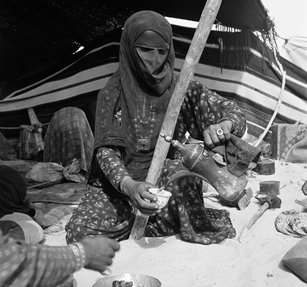Qahwa (Arabic coffee) is a traditional coffee drink that is popular in the Gulf region and is seen as a symbol of generosity and hospitality.
It is made with roasted and ground coffee beans, which are brewed in a pot called a dallah. The process of making coffee was traditionally performed in front of guests as a sign of respect and hospitality and is still practiced today in some households. Nowadays, you can find Arabic coffee being made in homes and other settings such as cafes and restaurants.
The common ingredients used to make qahwa are coffee beans, cardamom, cloves and saffron. Each family has a unique way of spicing it, some even adding milk or mastic. It is common to pair qahwa with something sweet like dates. The act of serving qahwa is highly ritualised and passed down within families to preserve it.
In 2015, Arabic coffee was inscribed on the UNESCO Representative List of Intangible Cultural Heritage of Humanity. This recognition highlights the importance of Arabic coffee to the cultural identity of the Arab world. Reflecting the cultural and heritage importance of Arabic coffee, Qatar applied with Saudi Arabia, Oman, and the United Arab Emirates to include it on the UNESCO Representative List of the Intangible Cultural Heritage of Humanity. The Qatari government has established a national committee for the safeguarding of Arabic coffee. This committee is responsible for developing and implementing strategies to safeguard Arabic coffee.
